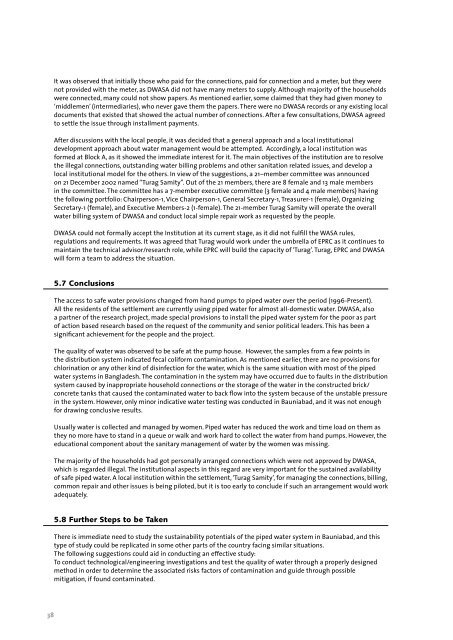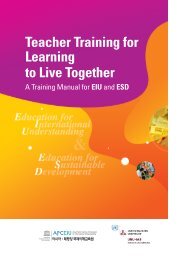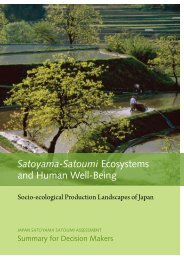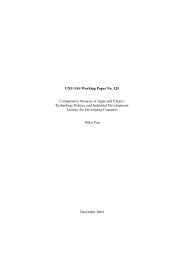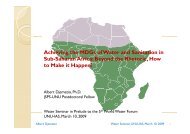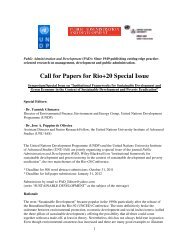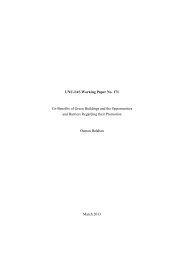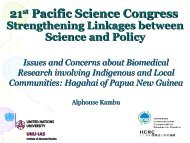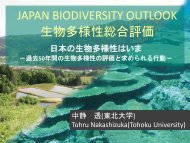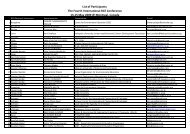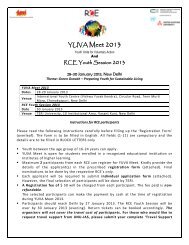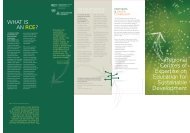Untitled - UNU-IAS - United Nations University
Untitled - UNU-IAS - United Nations University
Untitled - UNU-IAS - United Nations University
You also want an ePaper? Increase the reach of your titles
YUMPU automatically turns print PDFs into web optimized ePapers that Google loves.
It was observed that initially those who paid for the connections, paid for connection and a meter, but they were<br />
not provided with the meter, as DWASA did not have many meters to supply. Although majority of the households<br />
were connected, many could not show papers. As mentioned earlier, some claimed that they had given money to<br />
‘middlemen’ (intermediaries), who never gave them the papers. There were no DWASA records or any existing local<br />
documents that existed that showed the actual number of connections. After a few consultations, DWASA agreed<br />
to settle the issue through installment payments.<br />
After discussions with the local people, it was decided that a general approach and a local institutional<br />
development approach about water management would be attempted. Accordingly, a local institution was<br />
formed at Block A, as it showed the immediate interest for it. The main objectives of the institution are to resolve<br />
the illegal connections, outstanding water billing problems and other sanitation related issues, and develop a<br />
local institutional model for the others. In view of the suggestions, a 21–member committee was announced<br />
on 21 December 2002 named “Turag Samity”. Out of the 21 members, there are 8 female and 13 male members<br />
in the committee. The committee has a 7-member executive committee (3 female and 4 male members) having<br />
the following portfolio: Chairperson-1, Vice Chairperson-1, General Secretary-1, Treasurer-1 (female), Organizing<br />
Secretary-1 (female), and Executive Members-2 (1-female). The 21-member Turag Samity will operate the overall<br />
water billing system of DWASA and conduct local simple repair work as requested by the people.<br />
DWASA could not formally accept the Institution at its current stage, as it did not fulfill the WASA rules,<br />
regulations and requirements. It was agreed that Turag would work under the umbrella of EPRC as it continues to<br />
maintain the technical advisor/research role, while EPRC will build the capacity of ‘Turag’. Turag, EPRC and DWASA<br />
will form a team to address the situation.<br />
5.7 Conclusions<br />
The access to safe water provisions changed from hand pumps to piped water over the period (1996-Present).<br />
All the residents of the settlement are currently using piped water for almost all-domestic water. DWASA, also<br />
a partner of the research project, made special provisions to install the piped water system for the poor as part<br />
of action based research based on the request of the community and senior political leaders. This has been a<br />
significant achievement for the people and the project.<br />
The quality of water was observed to be safe at the pump house. However, the samples from a few points in<br />
the distribution system indicated fecal coliform contamination. As mentioned earlier, there are no provisions for<br />
chlorination or any other kind of disinfection for the water, which is the same situation with most of the piped<br />
water systems in Bangladesh. The contamination in the system may have occurred due to faults in the distribution<br />
system caused by inappropriate household connections or the storage of the water in the constructed brick/<br />
concrete tanks that caused the contaminated water to back flow into the system because of the unstable pressure<br />
in the system. However, only minor indicative water testing was conducted in Bauniabad, and it was not enough<br />
for drawing conclusive results.<br />
Usually water is collected and managed by women. Piped water has reduced the work and time load on them as<br />
they no more have to stand in a queue or walk and work hard to collect the water from hand pumps. However, the<br />
educational component about the sanitary management of water by the women was missing.<br />
The majority of the households had got personally arranged connections which were not approved by DWASA,<br />
which is regarded illegal. The institutional aspects in this regard are very important for the sustained availability<br />
of safe piped water. A local institution within the settlement, ‘Turag Samity’, for managing the connections, billing,<br />
common repair and other issues is being piloted, but it is too early to conclude if such an arrangement would work<br />
adequately.<br />
5.8 Further Steps to be Taken<br />
There is immediate need to study the sustainability potentials of the piped water system in Bauniabad, and this<br />
type of study could be replicated in some other parts of the country facing similar situations.<br />
The following suggestions could aid in conducting an effective study:<br />
To conduct technological/engineering investigations and test the quality of water through a properly designed<br />
method in order to determine the associated risks factors of contamination and guide through possible<br />
mitigation, if found contaminated.<br />
38


